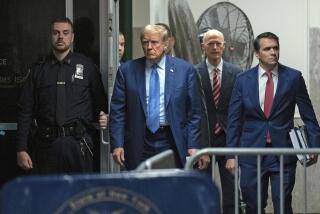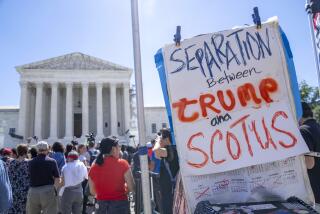Justices Protect Mitchell From Suit on ’70 Wiretap
WASHINGTON — The Supreme Court today shielded former Atty. Gen. John N. Mitchell from a lawsuit involving an unlawful 1970 federal wiretap.
In a 5-2 decision, the court said the former Nixon Administration official is entitled to immunity from the suit because in 1970, when the wiretap took place, it had not been “clearly established” that the wiretap was unconstitutional.
The court said, however, that Mitchell and other Cabinet officials do not have absolute immunity from suits arising out of allegedly unconstitutional conduct while in office.
The court in 1982 granted such total immunity to Presidents in a Watergate-related case involving Richard M. Nixon.
The 1970 wiretap Mitchell approved targeted Haverford College professor William Davidon, who the FBI said was plotting to kidnap then-National Security Adviser Henry A. Kissinger to protest the Vietnam War.
Keith Forsyth, an electrical engineering student in Philadelphia, filed suit in 1972 after learning that his phone conversations with Davidon had been tapped.
The U.S. 3rd Circuit Court of Appeals ruled last year that Mitchell was not immune to suit. The Reagan Administration, urging blanket immunity for attorneys general, had represented Mitchell in his Supreme Court appeal.
Mitchell, 71, is now a business consultant in Washington. He was convicted of covering up the 1972 Watergate break-in of Democratic National Committee headquarters and served 19 months in prison.
More to Read
Get the L.A. Times Politics newsletter
Deeply reported insights into legislation, politics and policy from Sacramento, Washington and beyond. In your inbox three times per week.
You may occasionally receive promotional content from the Los Angeles Times.










